10 Best Shopify AI Chatbots for 2026 (Compared with Pros & Cons)


Shopify in 2026 runs on fast, AI-assisted support that handles orders, returns, and cart recovery across web and social. YourGPT leads for AI-first, omnichannel automation with no-code setup; Tidio is best for quick install and live chat; Flyweight adapts brand tone with store-synced answers; ManyChat excels at Messenger and Instagram marketing; Zendesk AI fits enterprise teams; Gorgias is Shopify-native for refunds and order edits; Gobot and Octane AI power product quizzes; Botsify covers multilingual no-code bots; LivePerson suits custom enterprise builds. Choose by native Shopify integration, no-code speed, automation with human handoff, analytics, and security.
Shopify store owners in 2026 deal with high customer expectations, constant support queries, and the need to respond instantly across web, mobile, and social channels.
AI chatbots solve this by automating common tasks: answering order questions, recovering abandoned carts, and handling support without manual effort. They reduce the load on your team and improve the customer experience.
In this blog we will compare the 10 best Shopify AI chatbots for support in 2026. You’ll see what each platform offers, who it’s best for, and how it helps you run your store more efficiently.
Shopify store in 2026 requires speed, accuracy, and scale when customer expectations are high and competition is immediate. The chatbot you choose will directly influence customer experience, support efficiency, and sales operations.
An incorrect choice often leads to poor automation, generic conversations, missed sales, and inconsistent experiences across channels. Most importantly, it increases workload instead of reducing it.
Below is a focused evaluation checklist to help Shopify merchants select an AI chatbot aligned with operational goals:
The chatbot must connect directly to Shopify not through workarounds.
It should:
Ensure it supports:
A modern chatbot platform should offer:
The bot should interpret intent not just keywords.
The platform must provide unified support across:
This ensures continuity in customer communication regardless of the touchpoint.
Look for a solution that:
Operational improvement depends on measurable insights . The platform should report on:
Consistency in user experience increases engagement.
Ensure the chatbot allows:
The chatbot must support:
The platform must be ready for scale and change.
| Platform name | Best for |
|---|---|
| YourGPT | Shopify stores needing AI-first automation across support, sales, and ops with omnichannel |
| Tidio | SMBs combining live chat and AI on Shopify |
| Flyweight Chatbot | Brand-voice AI replies with nightly product sync |
| ManyChat | Conversational marketing on Messenger, Instagram, and SMS |
| Zendesk AI | Enterprise teams on Zendesk adding AI for Shopify support |
| Gorgias | Shopify-native helpdesk with refunds, edits, and order actions |
| Gobot | Guided shopping and product quizzes on storefront |
| Octane AI | Zero-party data capture and personalized quizzes for DTC brands |
| Botsify | No-code, multilingual bots across WhatsApp, Messenger, and web |
| LivePerson | Large enterprises needing custom conversational AI at scale |
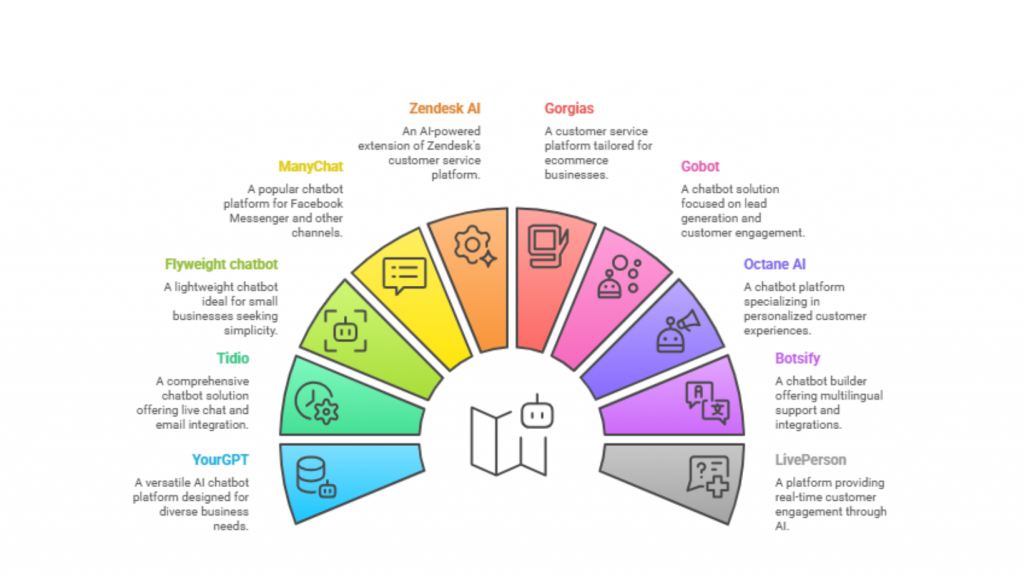
We have listed the top 10 AI chatbot solutions. Below is a list of the platforms covered. You can click any name to jump directly to its detailed review.
1. YourGPT
2. Tidio
4. ManyChat
5. Zendesk AI
6. Gorgias
7. Gobot
8. Octane AI
9. Botsify
10. LivePerson

YourGPT is a no-code AI chatbot platform built for Shopify businesses that want powerful customer support automation. It helps you answer customer questions, drive more sales, and stay connected through channels like your website, WhatsApp, Instagram and more. It’s a simple way to add smart, helpful support to your shop without needing to code.
Best For: Businesses of any size looking to deliver 24/7 AI support and automation across multiple channels without writing code.

Book a demo with our experts to learn more about YourGPT and how it can help your business.

Tidio is a live chat and chatbot platform built for businesses that want quick setup and multichannel communication. It’s especially useful for teams looking to blend human support with AI-driven automation.
Best For: Combining live chat with AI for small to medium-sized businesses.
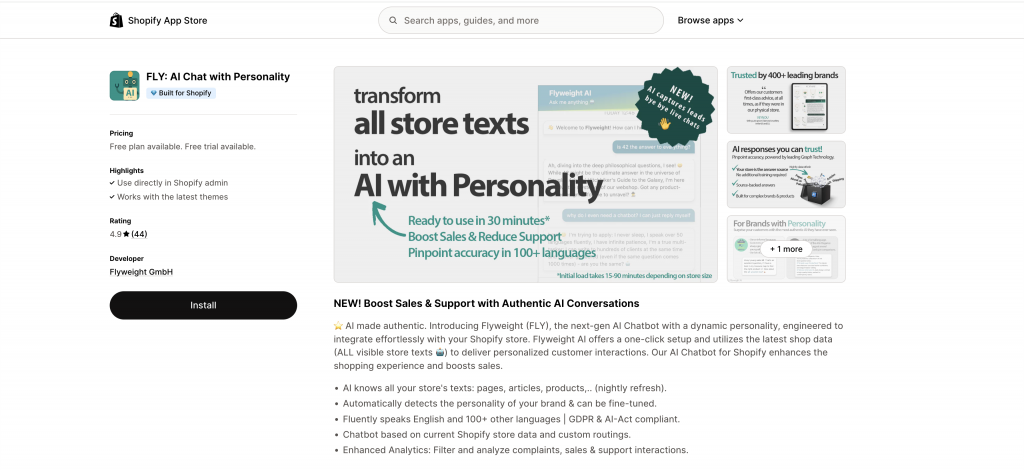
Flyweight is an AI chatbot for Shopify that answers customer questions in your brand’s voice. It helps with sales and support, is easy to set up, and always uses the latest information from your store.
Best For: Shopify merchants who want a AI chatbot that personalises customer engagement and streamlines support.
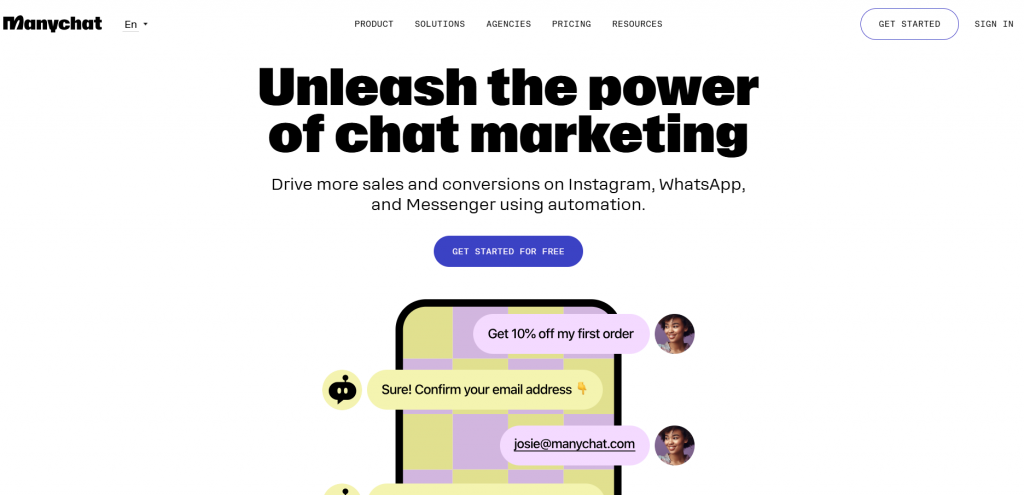
ManyChat is designed for businesses that rely on conversational marketing via social platforms. It helps automate messages and drive sales through channels your customers already use.
Best For: Marketing automation through Messenger and SMS.

Zendesk AI brings automation to large-scale customer support teams by combining AI tools with its established helpdesk system. It’s best for companies already using Zendesk that want to improve response speed without changing platforms.
Best For: Enterprises using Zendesk for customer support.

Gorgias is built specifically for e-commerce brands using Shopify, offering direct access to store data inside customer chats. It’s ideal for support teams that need quick actions like refunds and order edits without switching tabs.
Best For: Shopify-focused customer support and helpdesk solutions.

Gobot focuses on interactive customer engagement through AI chatbots, helping online stores guide visitors to the right products. It’s best suited for businesses that want to offer personalized shopping experiences directly on their website.
Best For: Creating interactive product recommendation quizzes.

Octane AI is built for e-commerce brands that want to collect valuable customer data and boost conversions with personalized experiences. It works well for stores focused on growing their audience and tailoring product recommendations.
Best For: Personalized product quizzes and zero-party data collection.

Botsify is a no-code chatbot platform made for teams that want to deploy bots across popular messaging apps. It’s a good fit for businesses aiming to reach users in different languages and channels without coding.
Best For: Custom no-code chatbot creation with multilingual support.

LivePerson is built for enterprises that need highly customized, AI-driven conversations at scale. It helps brands automate support and sales across channels with advanced natural language capabilities.
Best For: Large businesses requiring custom conversational AI solutions.
Not every Shopify store runs the same way—or needs the same kind of chatbot.
A digital product business offering online courses has very different requirements compared to a fast-moving fashion brand or a high-volume electronics dropshipper.
To make it simple, here’s a practical comparison based on:
| Store Type | What You Need from a Chatbot | Top Features to Look For |
|---|---|---|
| Multi-category / General Stores | Unified support and product sync across channels | Product lookup, order tracking, multi-channel chat (WhatsApp, Instagram, site), zero-code setup |
| High-volume / Dropshipping | Fast responses and bulk order handling | Helpdesk + chatbot in one, real-time order updates, canned responses, peak load handling |
| Custom Products / Tech & Gadgets | Guided conversations to simplify decision-making | Quiz-based flows, spec filtering, custom product explanations |
| Digital Products / Services | Educational flows and onboarding without manual effort | Multi-language support, knowledge base integration, WhatsApp/API messaging |
| Campaign / Offer Driven Stores | Lead capture and promotions that run 24/7 | Messenger/SMS automation, subscriber building, cart recovery, timed offers |
| Scaling Brands (D2C or B2C) | One tool that works across growth stages without constant reconfiguration | Shopify-native sync, auto-scaling workflows, integrations with CRM, marketing tools, live-agent fallback |
If you’re looking for one chatbot platform that adapts to different store types, offers native Shopify sync, handles both support and sales, and works across multiple channels there are a few standout options in the market.
Some tools go beyond just chat. They help automate entire customer journeys from product discovery to post-purchase support which becomes more valuable as your order volume increases.
Think long-term. The right chatbot isn’t just about handling queries. It should fit directly into your workflow whether you’re testing your first campaign or managing tens of thousands of orders every month.
AI chatbots have become essential for running modern Shopify stores. They help reduce manual work, improve speed, and deliver better customer experiences across every stage of the buyer journey.
1. 24/7 Customer Support for Orders
Chatbots instantly handle common questions like “Where’s my order?” or “When will it be delivered?” They connect directly to your Shopify backend to pull live tracking updates, so customers get accurate answers without waiting.
2. Automating Returns and Refund Requests
Customers can initiate a return, check refund status, or ask about your return policy directly in chat. The chatbot guides them step-by-step, reducing back-and-forth emails and freeing up your support team.
3. Capturing Leads from Store Visitors
When visitors browse your Shopify store, the chatbot can ask simple qualifying questions and collect contact details. It helps convert interest into leads—useful for both sales follow-up and remarketing.
4. Personalised Product Recommendations
AI Chatbots in e-commerce improve product discovery by asking users a few basic preferences and showing relevant products. It works especially well for stores with large inventories, bundles, or custom configurations.
5. Multi-Channel Customer Conversations
Shopify chatbots support conversations on Instagram, WhatsApp, Messenger, and web chat—all from one place. Whether a customer messages you via DMs or from your product page, the chatbot can look up orders and reply instantly.
6. Cart Recovery and Campaign Automation
They send automated reminders when someone abandons a cart, promote time-sensitive discounts, or follow up after browsing. These small nudges help bring shoppers back and increase conversions.
7. Managing High-Volume During Sales
During peak sales periods or flash drops, a AI chatbot filters incoming queries and handles repetitive ones like “What’s the offer?” or “Is it in stock?”—keeping your team focused on priority issues.
8. Supporting International Customers
Many Shopify stores sell globally. AI Chatbots that understand multiple languages help serve international customers without needing separate support staff, improving response time and consistency.
You don’t need a developer. Most Shopify chatbots offer step-by-step setup, visual builders, and templates for common tasks like order tracking and cart recovery.
Yes. You can train it using your store’s FAQs, return policy, product descriptions, and more. It will respond based on the information you provide.
Yes. Many chatbots support multiple channels. You can manage customer conversations across your website, Instagram, WhatsApp, and Messenger from one place.
Most platforms show clear reports. You’ll see how many questions it answered, how many carts it recovered, and how many sales it supported.
It can pass the conversation to a human agent. The agent sees the full chat history and can respond without needing the customer to repeat anything.
Yes. You can adjust the colors, messages, avatar, and tone to match your brand. Some platforms also let you add your logo and custom greetings.
Yes—if you choose a trusted platform. Look for GDPR- and CCPA-compliant providers. Your data should be encrypted and stored securely.
Yes. It helps customers find products, answers their questions quickly, and recovers abandoned carts—all of which can lead to more sales.
Yes. Many platforms offer built-in multilingual support. You can chat with customers in their preferred language without hiring extra support staff.
AI chatbots have become essential tools for Shopify stores. They help handle support, answer customer questions faster, and recover sales that might otherwise be lost. For many merchants, they’re now part of daily operations not just a bonus feature.
But not all chatbots are the same. Some are built for speed and live chat, like Tidio. Others, like Octane AI and Gobot, focus on product discovery. YourGPT is the most complete option if you need automation for support, sales, and internal workflows in one place. If you run a large operation or need advanced AI features, tools like LivePerson or Zendesk AI offer deeper customization.
The best option depends on the size of your store, the things you sell, and where you’re losing time or sales. Start by identifying and listing your top support concerns, such as order tracking, product questions, or missing follow-ups. Then select a AI chatbot intended to address those specific issues.
Join thousands of businesses using AI Chatbot to automate support and boost engagement.
No credit card required • Full access • Cancel anytime
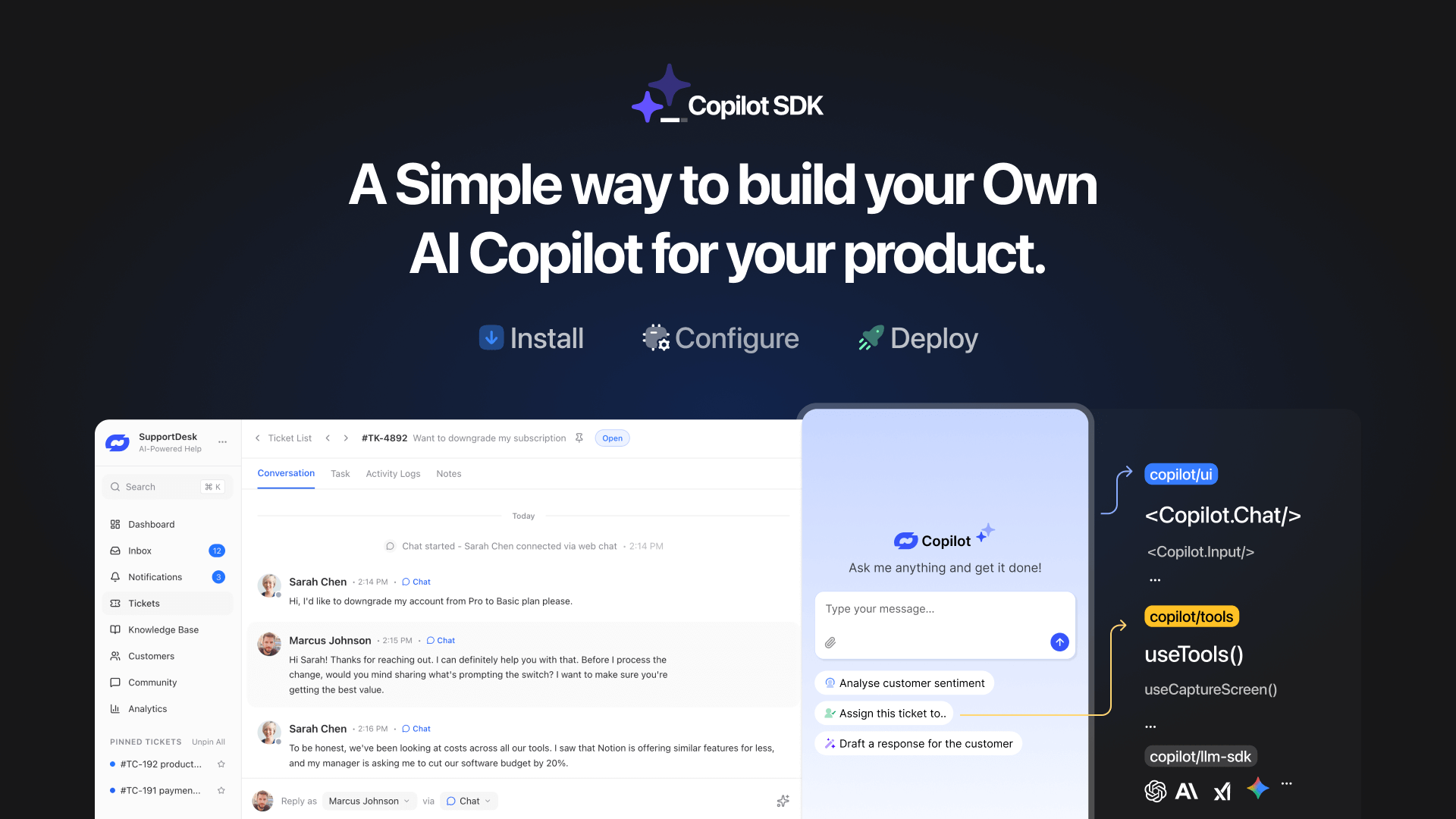
TL;DR YourGPT Copilot SDK is an open-source SDK for building AI agents that understand application state and can take real actions inside your product. Instead of isolated chat widgets, these agents are connected to your product, understand what users are doing, and have full context. This allows teams to build AI that executes tasks directly […]

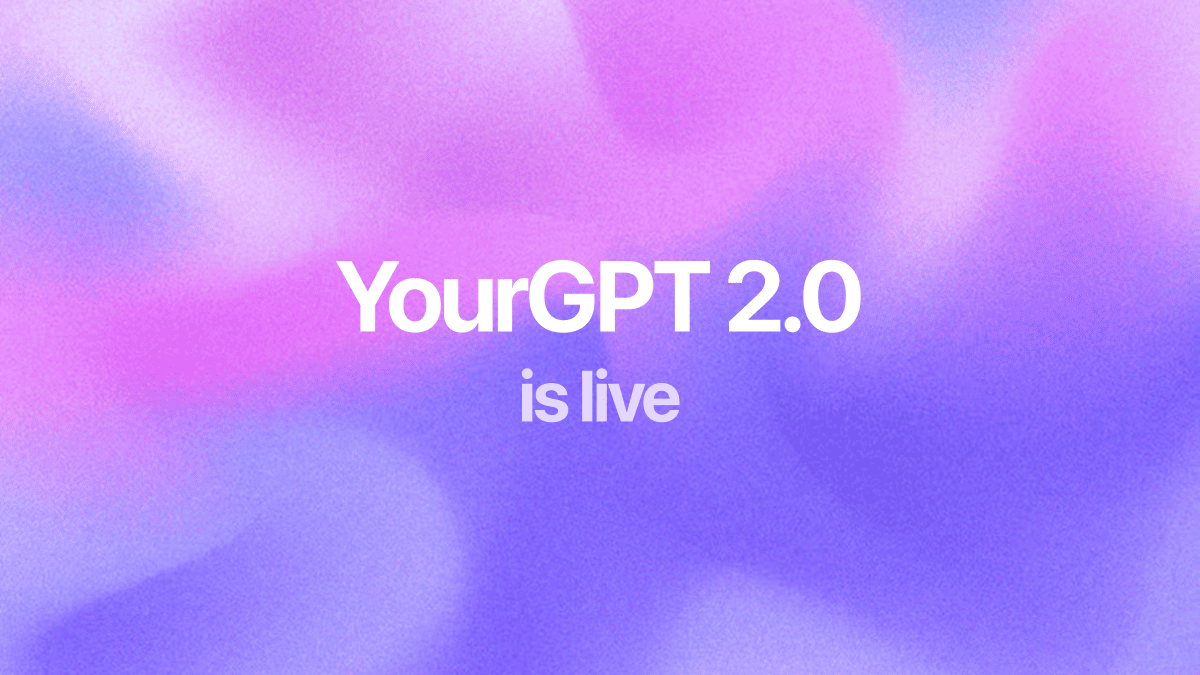
Businesses today expect AI to do more than answer questions. They need systems that understand context, act on information, and support real workflows across customer support, sales, and operations. YourGPT is built as an advanced AI system that reasons through tasks and keeps context connected across every interaction. This intelligence sits inside a complete platform […]

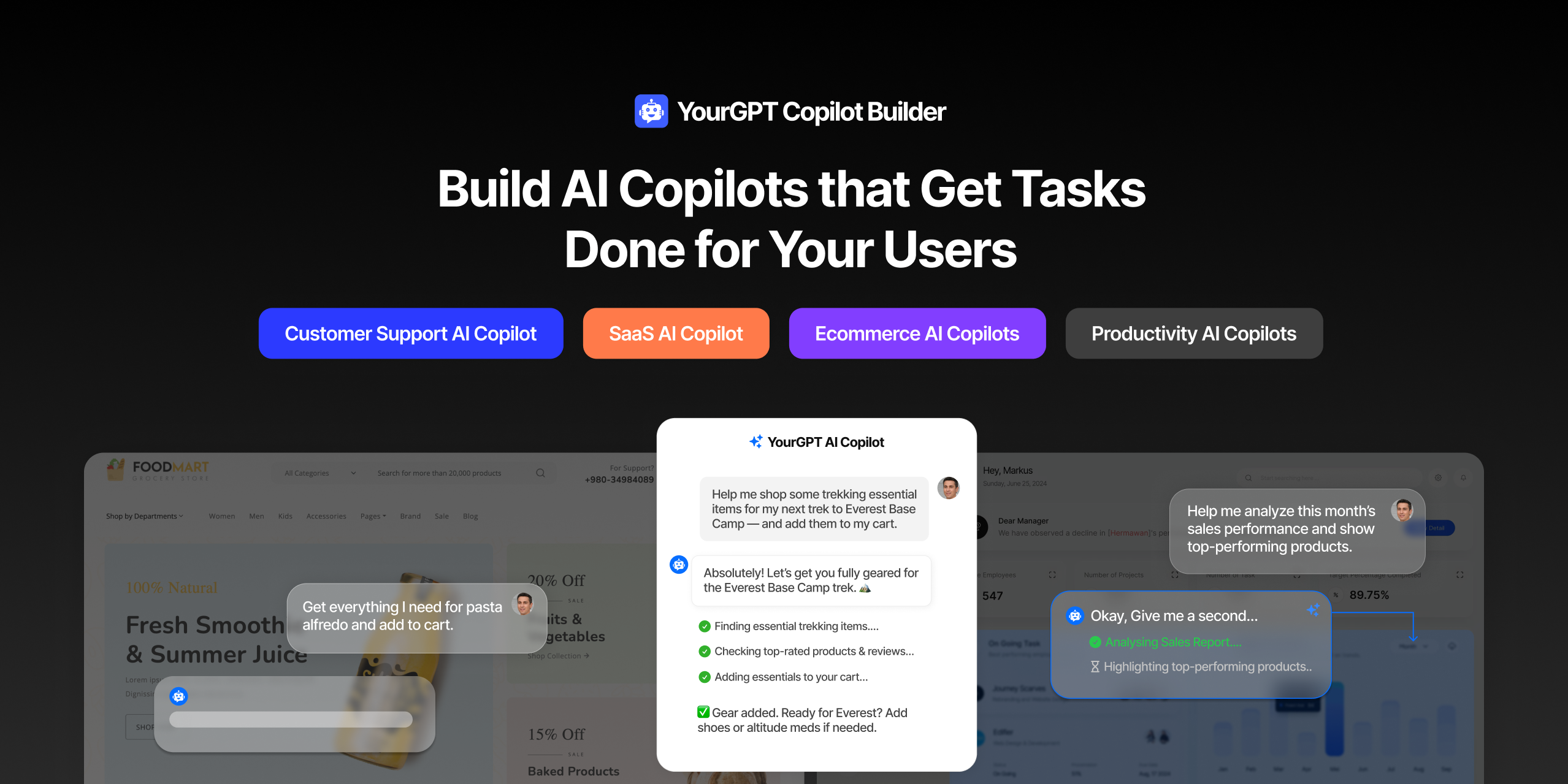
AI can help you finds products but doesn’t add them to cart. It locates account settings but doesn’t update them. It checks appointment availability but doesn’t book the slot. It answers questions about data but doesn’t run the query. Every time, the same pattern: it tells you what to do, then waits for you to […]


GPT-driven Telegram bots are gaining popularity as Telegram itself has 950 million users worldwide. These AI Telegram bots allows you to create custom bots that can automate common tasks and improve user interactions. This guide will show you how to create a Telegram bot using GPT-based models. You’ll learn how to integrate GPT into your […]


TL;DR The 10 best no-code AI chatbot builders for 2026 help businesses launch quickly and scale without developers. YourGPT ranks first for automation, multilingual chat, and integrations. CustomGPT and Chatbase are ideal for data-trained bots, while SiteGPT and ChatSimple focus on easy setup. Other options like Dante AI, DocsBot, and Botsonic specialize in workflows and […]


GPT Chatbot for Webflow: The Key to Exceptional Customer Service Providing great customer service is essential for any business, but managing a high volume of inquiries can be a challenge.If you use Webflow, integrating a webflow chatgpt can simplify this process. This AI-powered webflow chatbot offers consistent, personalised responses to customer queries, helping you manage […]
